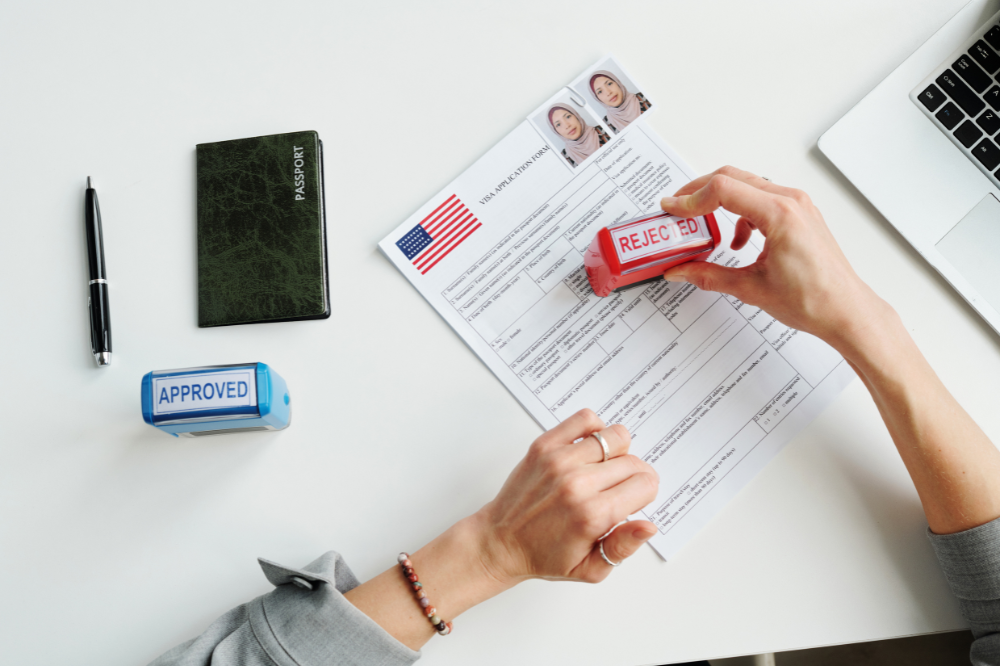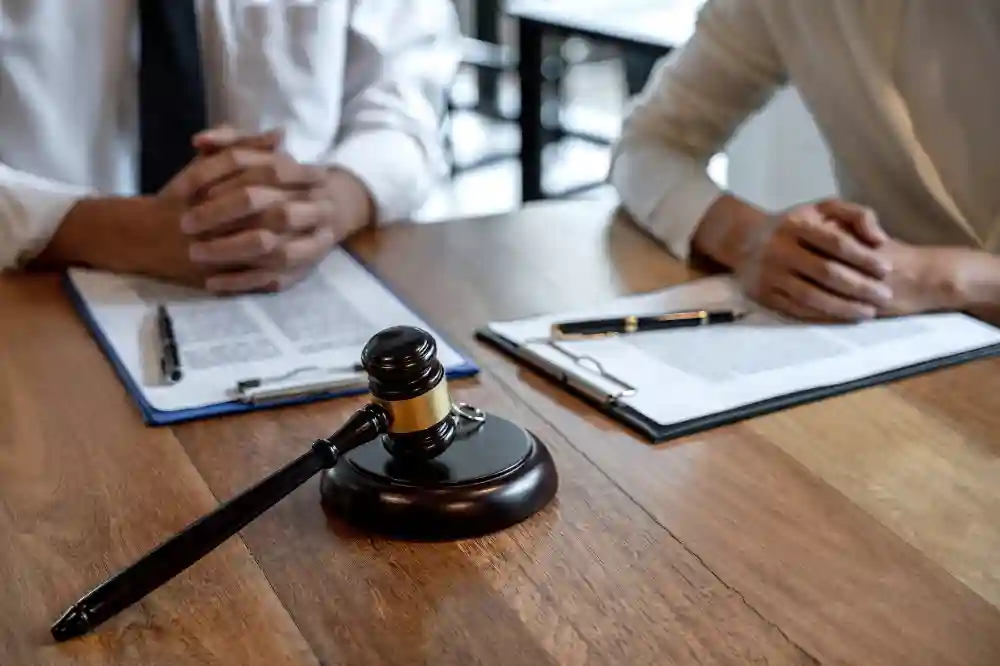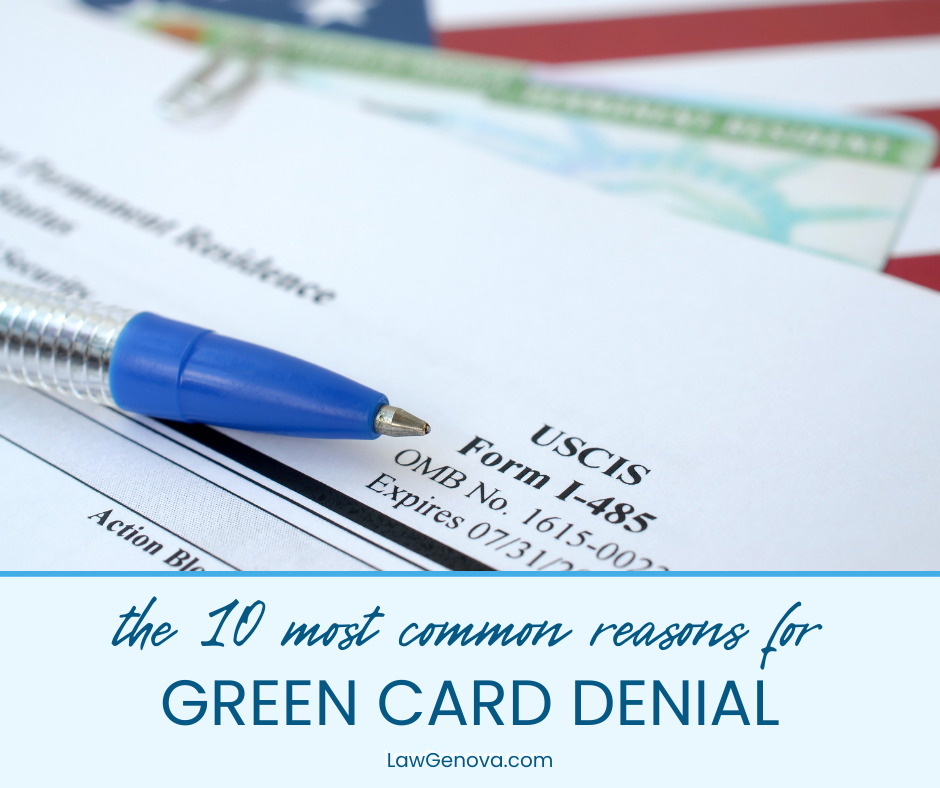The U.S. government receives tens of thousands of green card petitions every year, and it doesn’t approve them all. In fact, U.S. Citizenship and Immigration Services (USCIS) denies a significant number of green card petitions. There are several reasons USCIS denies green cards, ranging from errors in paperwork to applicants’ criminal histories. This guide explains the ten most common reasons for green card denial in the U.S., as well as what you can do if the government turns down your green card application.
The 10 Most Common Reasons for Green Card Denial in the U.S.
Although USCIS may deny a green card petition for any number of reasons, the most common include:
- Failure to meet application requirements
- Criminal history
- Health issues
- Security concerns
- Missed immigration appointments
- Denial of your visa petition
- Past violations of immigration law
- Errors in paperwork
- Failure to respond to an RFE in time
- The conditions that made you eligible for a green card no longer exist
The following sections give you a closer look at each.
Reason #1 for Green Card Denial: Failure to Meet Application Requirements
When you apply for a green card, you must meet application requirements. Sometimes, the requirements vary based on the reason you’re eligible for a green card. For example, if you’re eligible for a green card because you’re an immigrant investor participating in the EB-5 program, you must show that you have enough capital to invest in a U.S.-based business; if you’re eligible for a green card because you’re married to a U.S. citizen, you’re required to submit proof of your qualifying relationship with your application. If you fail to provide the documents you need to prove that you meet application requirements, USCIS will deny your green card application.
Your immigration attorney can help ensure that you meet application requirements before submitting a green card petition on your behalf. There’s no use applying if you don’t meet the requirements, so your lawyer will double-check the requirements for your situation; if you don’t meet them, you can discuss your options.
Reason #2 for Green Card Denial: Criminal History
If you have a criminal history, USCIS will carefully review your green card application to determine whether you’re eligible. Your eligibility depends on the severity and nature of your past offenses. For example, if you have been convicted of a “crime of moral turpitude” or an aggravated felony, you may be ineligible for a green card and USCIS will generally deny your petition. But don’t lose heart just yet: You may be able to overcome ineligibility for a green card due to your criminal history by applying for a waiver. Though waivers aren’t available in every situation, your immigration attorney will determine whether one may be available to you. If you’re eligible for a waiver, your lawyer will talk to you about how you can use it to submit a new green card petition.
Related: Can you get a green card with a criminal record?

Reason #3 for Green Card Denial: Health Issues
If you have certain health conditions, USCIS may deny your green card application. The conditions that would lead to a green card denial vary depending on the program under which you’re applying, but they generally fall into two categories: communicable diseases and mental health conditions. If USCIS believes that you have a communicable disease that could endanger public health, it may deny your application. The same is true if you have a mental health condition that USCIS believes makes you ineligible for a green card. (These conditions typically include disorders that create behavior that’s harmful to other people’s safety or public welfare.)
Reason #4 for Green Card Denial: Security Concerns
USCIS may also deny your green card application if it believes you pose a risk to national security. These concerns typically arise when an applicant has ties to terrorist organizations or other groups that USCIS considers a threat to national security. But even if you don’t have ties to such groups, USCIS may still deny your green card application if it believes that you pose a danger to the community. If you have a history of engaging in espionage, sabotage, coups or something similar, or if you’ve been convicted of violating certain U.S. laws related to trade, technology or other crimes, you may be in line for a green card denial.
Related: Everything you need to know about the U.S. citizenship test
Reason #5 for Green Card Denial: Missed Immigration Appointments
When you apply for a green card, you need to attend several appointments with USCIS. These appointments include an interview, a medical examination and possibly biometrics (such as fingerprints and photographs). If you fail to show up for any of these appointments, USCIS may deny your application. The agency can’t process your green card without sufficient information, which it generally gathers through these appointments. If you don’t show up and don’t reschedule, USCIS will reject your green card petition.

Reason #6 for Green Card Denial: Denial of Your Visa Petition
USCIS will deny your green card application if it denies the visa petition that you submitted along with it. For example, if you’re applying for a green card as an employment-based immigrant, USCIS will need to approve both your I-140 visa petition (submitted by your employer) and your I-485 green card application. If USCIS denies the visa that would have made you eligible for a green card, it will deny your green card application.
Related: Removal defense strategies attorneys can use in deportation cases
Reason #7 for Green Card Denial: Past Violations of Immigration Law
If you’ve violated U.S. immigration law in the past, USCIS may deny your green card application. Violations may include things like overstaying a visa, working without authorization or being deported from the United States. If you have any past violations on your record, speak to an experienced immigration attorney before you apply for a green card. Your lawyer can help you understand whether your past actions will lead to a green card denial; if things don’t look like they’ll work out in your favor, your attorney can help you plan your next steps. You may be eligible for a waiver or some other form of relief, or you may need to wait to apply for your green card.
Reason #8 for Green Card Denial: Errors in Paperwork
USCIS denies many green card applications because of errors in the paperwork. This can include things like incorrect dates, misspellings, missing signatures and discrepancies between documents. If USCIS finds even a small error in your paperwork, it may deny your application and ask you to resubmit it with the correct information. That’s why it’s so important to have an experienced immigration attorney prepare your green card application for you. An attorney can make sure everything is in order before USCIS even gets eyes on your petition.
Related: How to help your parents get green cards
Reason #9 for Green Card Denial: Failure to Respond to an RFE in Time
If USCIS needs more information from you during the green card application process, it will send you a request for evidence (RFE). An RFE is a formal notice that asks you to provide additional documentation or information so that USCIS can make a decision on your application. You have a specific amount of time to respond to the RFE; if you don’t, USCIS will deny your green card petition because you failed to provide the information the agency needs. And just so you know: It’s often okay to ask for an extension if you need more time on an RFE. Your attorney can coordinate with USCIS to ensure that the agency gets the information it needs, even if you can’t gather the info immediately.

Reason #10 for Green Card Denial: The Conditions That Made You Eligible for a Green Card No Longer Exist
There are many ways a person can qualify for a green card. For example, you might be eligible for a green card through your family, your job or your refugee status. But in some cases, the conditions that made you eligible for a green card in the first place can change. If that happens, USCIS may deny your green card application. For example, if you apply for a green card based on your marriage to a U.S. citizen but you divorce your spouse, USCIS may deny your green card application because you are no longer married to a U.S. citizen. (However, in some cases, you may still be eligible to apply for a green card – even if the original conditions that made you eligible for a green card no longer exist. You should talk to an immigration attorney if you’re in a situation like this.)
What Happens if You Receive a Green Card Denial?
If USCIS denies your green card petition, you will receive a written notice that explains the reason for the denial. The notice will also tell you what you can do if you disagree with the decision. In some cases, you may be able to appeal the denial or submit a new application.
You may need to leave the U.S. if USCIS denies your green card petition. Because you could be subject to removal proceedings, it’s probably in your best interest to talk to an attorney after a green card denial – especially if you wish to remain in the United States.
Do You Need to Talk to an Immigration Attorney About a Green Card Denial?
If you need to talk to an immigration attorney, we may be able to help you. Call our office at 914-481-8822 to schedule a consultation with an experienced, knowledgeable immigration attorney who can answer your questions and give you the legal advice you need.


